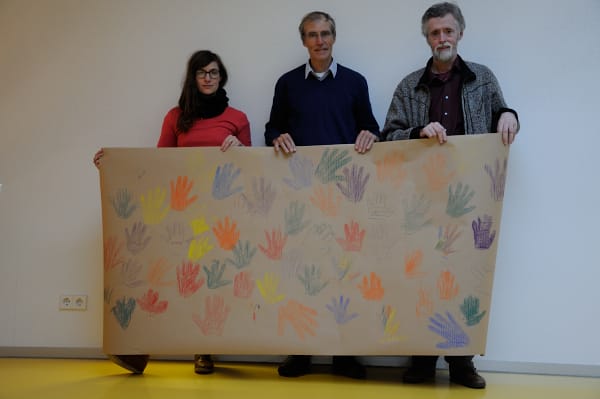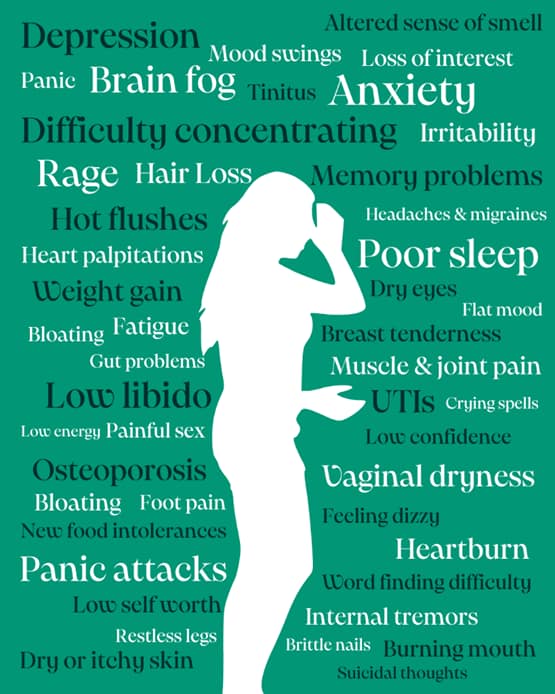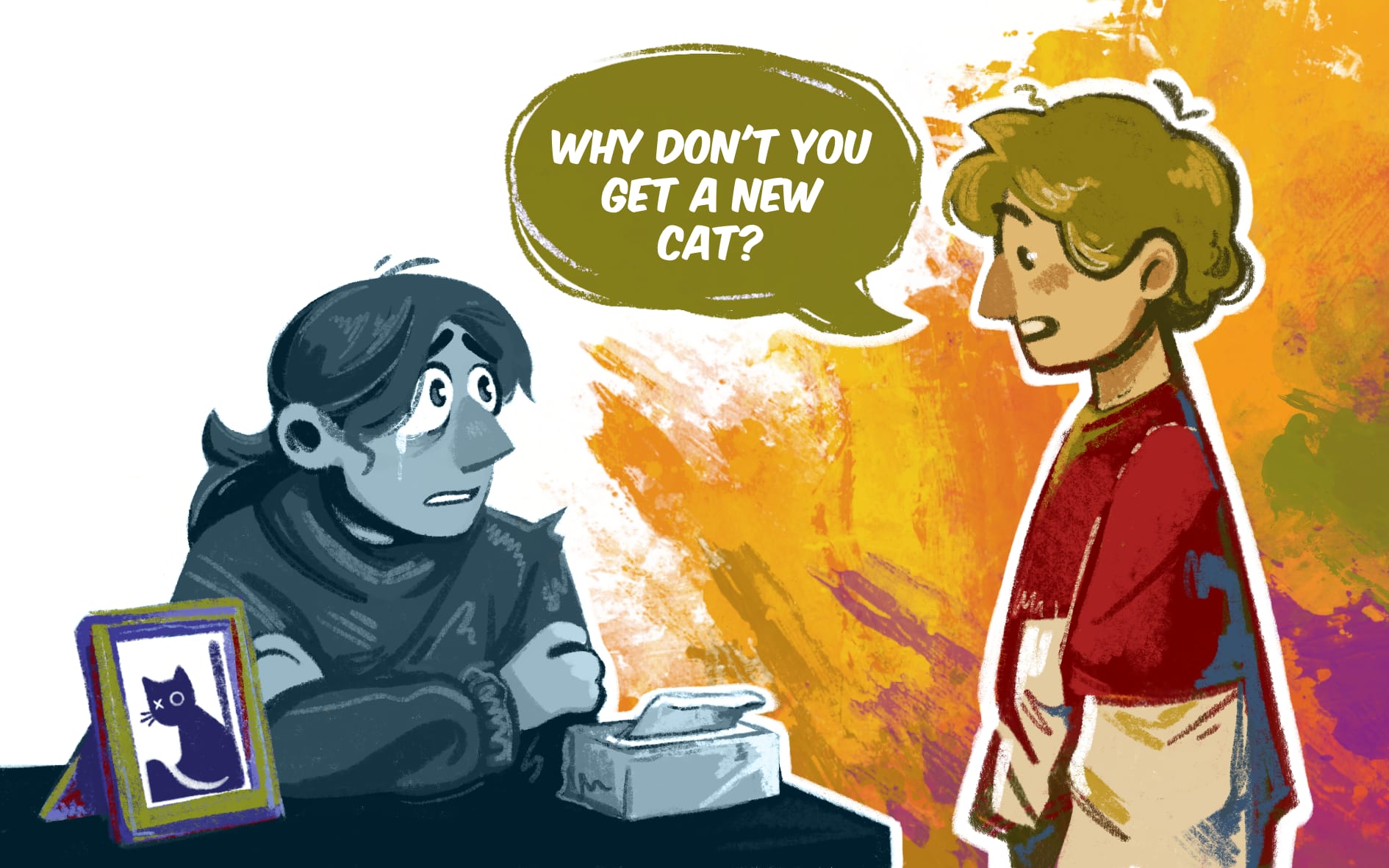
Myths Left to Handle

All researchers working with human subjects know that it can sometimes be difficult to get a good sample size. During the Weekend of Science in October, Ton Groothuis, Reint Geuze and Nele Zickert launched their large-scale study on handedness (see Boxes 1 & 2), with which they are trying to achieve a sample size of 30.000 participants. And they may very well succeed[1].
Your study is about the myths surrounding handedness. What are they?
Ton Groothuis There exist a number of myths concerning left-handedness, among lay people as well as scientists. For example, many people think that left-handed people are more creative than right-handed people. Also, there exist theories in the field of biology that link left-handedness to disadvantages in health. The scientific evidence concerning these statements is mixed or absent. With this research, we aim to address the validity of these propositions about left-handedness.
Why is it that you are studying handedness?
Ton Groothuis The questions we address are driven by our interest in the evolution of handedness. About 10% of the human race is left-handed, and that holds true, more or less, for every culture on earth. Behavioural ecologists explain that left-handedness must bring costs with it, otherwise 50% of the population would be left-handed, but there must also be benefits associated with left-handedness, because otherwise this trait would have been filtered out by natural selection. So why is it that left-handers are a minority, but they are still here?
The costs are sought in associated health problems. For example, studies have shown that of children who are born prematurely, there are more left-handed than you would expect given the percentage of left-handers in the entire population. Researchers at the Neonatology department of the UMCG have also found this in a large study on the development of preterm infants. The hypothesis with regard to this finding is that the right and left cerebral hemispheres have different grow rates, which makes them differentially vulnerable for stress factors during the maturation process. Aside from these findings, links between left-handedness and schizophrenia, and left-handedness and dyslexia have been shown. However, there are also studies that do not support such relations. In our web-based study we include health related questions. We will have a much larger sample size than the studies on health-related problems and left-handedness so far, and thus hope to be able to make better judgments about the validity of these claims.
| GOING NATIONALThe Weekend of Science (‘Weekend van de Wetenschap’), funded by the ministry of Education, Culture and Science (OCW), yearly organizes a large public research project. This gives researchers the chance to reach the entire Dutch (and Dutch-speaking Belgian) population, by means of a lot of media attention, broadcasts, and a link on their website. The goal is to give everybody the chance to participate, which leads to a large sample size, and a representative sample. The subject of study should of course raise the laymen’s curiosity. Previous studies have been on emotion, sleep, stress and language (see http://www.npowetenschap.nl/programmas/grootnationaalonderzoek.html for results, and the possibility to still participate in some active studies). This year, a group of BCN members was elected to launch their research during the Weekend of Science: Ton Groothuis, Reint Geuze and Nele Zickert’s will study handedness and a number of myths surrounding it. The kick-start of the study was on October 1st, in the Rijksmuseum Amsterdam, where, amongst others, Secretary of State Sander Dekker was present (and a participant!). Later that week, the Weekend of Science proved a fruitful event to test visiting children and adults using a number of behavioural tests and questionnaires. During this special weekend, the handedness group therefore was present in NEMO Amsterdam (an educational and interactive science museum), the Apenheul Zoo in Apeldoorn, and Zernike and the University Museum in Groningen. Already hundreds of people were tested during the weekend. The next stage of this large-scale research is a web-based study. On www.helpeenhandje.nl (a website created by Nele Zickert) people can participate online, and find out more about this research. |
“being in the minority sometimes brings along advantages”
You indicated that there must also be benefits associated with being left-handed, as left-handedness has not died out.
Ton Groothuis The benefits have been suggested to be the result of frequency-dependent selection: being in the minority sometimes brings along advantages. This follows from economic models showing that there can be several strategies to reach a certain goal, for example to have children, and that some deviating strategies may be advantageous, but only when they are not used too often. For example, in an animal population with many big, strong males, you sometimes see smaller males acting as if they are females. This way, they don’t have to battle the strong males and will be able to secretly leave sperm with the actual females. The result is successful passing on of their genes. Of course, this only works when these transsexual males are a minority, because otherwise the strong males would adapt to this competition and prevent them from using this strategy.
How is being left-handed going to help your genes survive?
Ton Groothuis In line with the idea of frequency-dependent selection, one theory is that being left-handed may give you an advantage in fighting. Attacking with your left hand may work as a surprise effect on your opponent, who is used to fighting with right-handed people. This of course only works when left-handers are in the minority, because otherwise right-handed competitors will train to beat left-handed opponents. This has been related to man-on-man combat in early days, and given as an explanation of why a part of the population is still left-handed.
In these more modern times, this fighting hypothesis could be extended to left-handers in sports. There are studies that show that there are more left-handed professional sportsmen than should be expected. We did a meta-analysis on these studies and a result is that, in combat sports, you see many more left-handers than in other sports. Combat sports are sports that usually involve physical contact, and are one-on-one (so, for example, chess and swimming are not combat sports). As such, the link with an advantage for left-handers in fighting seems obvious. However, this finding does not necessarily mean that left-handers are more successful in combat sports than right-handers. It may also be the case that they are more drawn to these sports than to other sports. The literature is unclear about whether left-handers really have a larger chance to win or not (attributed to this supposed surprise effect). If left-handers are more drawn to combat sports, it may be rather something like aggressiveness that explains the overrepresentation of left-handed people in combat sports. With our studies in the highlands of Papua Indonesia in a non-industrial society, we did not find support for the fighting hypothesis. This is why in our study we included questions about aggressiveness, so we can study a possible relation of this factor with left-handedness.
| THE TASKS AT HAND During the Weekend of Science, hundreds of visitors at NEMO, Apenheul, Zernike and the University Museum were tested. As many visitors at the first two of these places are young children, the tasks needed to be suitable for all ages. One of the tasks was for people to draw the outline of their own hand (draw around their hand and fingers). When a right-handed person is asked to do this, he or she will use their right hand to draw, and thus the outline of their left hand appears on the paper. Likewise, left-handers will draw their right hand. This was inspired by the cave arts of human species 10.000 years or more ago, which indicated that already at that time right-handers were much more prevalent than left-handers. Participants were encouraged to use coloured crayons to indicate what kind of personality they thought they had (e.g. creative, sporty), using a predefined colour-character trait mapping made by the researchers. At the moment, the researchers are counting hands, and can study whether a relation between handedness and personality exists. Another task was a classical test to measure dexterity (how skilled each hand is) using the pegboard. In this test, people have a wooden board in front of them with 10 small pegs in a row of holes. Their task is to move the pegs from one row of holes to a next row of holes as fast as they can. They do this twice for each hand to determine whether one hand is more skilled than the other.The third task was to complete an unfinished drawing. Participants were given a sheet of paper with two curved lines, and were asked to complete this into an artistic drawing. The next part of this task was actually more important: to judge the drawings of the other participants on creativity. On the drawings it was marked whether a right-hander or left-hander had completed them. In this way, the researchers can measure whether drawings of left-handed people were evaluated as being indicative of more creativity than those of right-handers, or not. |
During the Weekend of Science, you tested right- and left-handers on creativity. Does this also relate to the survival of left-handedness?
Reint Geuze Especially in the general population, the idea exists that left-handed people are more creative than right-handed people. There are several reasons why being creative could give you an advantage, from an evolutionary point of view. Especially problem-solving creativity (as opposed to artistic creativity) could be useful in the survival of an individual, a group or even population. A typical human example is of course the invention of tools. However, at this moment the scientific evidence for this theory is weak.
Another way in which creativity may help your genes survive is that being very creative may make you more attractive to the other sex. In our web-based study we included a measure of both artistic and problem-solving creativity.
A lot of factors are included in this study. Does it take a lot of time to participate?
Reint Geuze No, we have made an effort to keep the study short, because we do want participants to finish it. This means that some questions and subjects that we would have liked to include did not end up in the final version. Doing a web-based study of course comes with some challenges. We also need to think about how to guarantee the quality of our data, as we have less control on this. For example, is it a problem if people participate in the online study more than once? However, the advantages of doing a large-scale study in the entire Dutch population outweigh these challenges. Another problem with the studies about combat sports and creativity is that the samples were drawn not from the general, but from a professional population. So the findings we have about sportsmen, are only about top sportsmen, and the findings about creativity about professional artists. This does not tell us anything yet about whether the described selection mechanisms are also at work in the general population.
Ton Groothuis The fact that we can reach the entire Dutch population is something very new to us, and very valuable. Interestingly, so far there seems to be an overrepresentation of left-handers among the people who participated in the study during the Weekend of Science, as well as among the people who participated through the website. Apparently, this subject is very alive among the general population, but particularly appealing to left-handed people.
Ton Groothuis and Reint Geuze tell me that there is definitely a chance there will be a follow-up study next year, depending on which new questions are raised by the data. I can tell that these researchers are very creative (though not aggressive), and that my data are in the right[2] hands: without delay I participated in the study on www.helpeenhandje.nl. The study is still open, and I would encourage every reader to go to the website and do the study[3]. You will contribute to the success of this research, but you will also find out some interesting things about yourself. For example, I learned that I am very right-handed, but that my right and left hand are equally skilled on a motor task. That’s right: a motor task. Not just boring questionnaires. It’s actually the most fun online study I ever participated in, hands down.
Text and Photo by Sanne Brederoo
| MORE LATERALISATION RESEARCH Ton Groothuis (Faculty of Natural Sciences) and Reint Geuze (Faculty of Behavioral and Social Sciences) have been collaborating for years, studying hemispheric lateralisation in relation to handedness, and also other lateralised functioning. They received an NWO grant twice, and Ton Groothuis was given a large European grant for research on lateralisation in mice, fish, and humans. Nele Zickert is one of Ton Groothuis’ and Reint Geuze’s PhD students. She uses, among other methods, functional Transcranial Doppler (fTCD) and MRI to study the relation between cognition and the strength of lateralisation in humans. Another of their PhD students, Tess Beking, studies the role of sex hormones on lateralisation. To this end, she analyses fMRI data of a group of transsexuals, in collaboration with the VU Medical Centre Amsterdam. Another of her projects is a large fTCD study to measure lateralisation of cognitive and emotional functioning in adolescents whose prenatal hormone levels were measured before birth. |
[1] At the moment of writing 23.000 people had participated in the online study at www.helpeenhandje.nl
[2] Although Ton Groothuis is actually left-handed
[3] For now, the study is only in Dutch, but an English version may be on its way




Having participated and being left-handed, of course I hope Mindwise will feature a piece on the study’s results this year. Happy 2015!